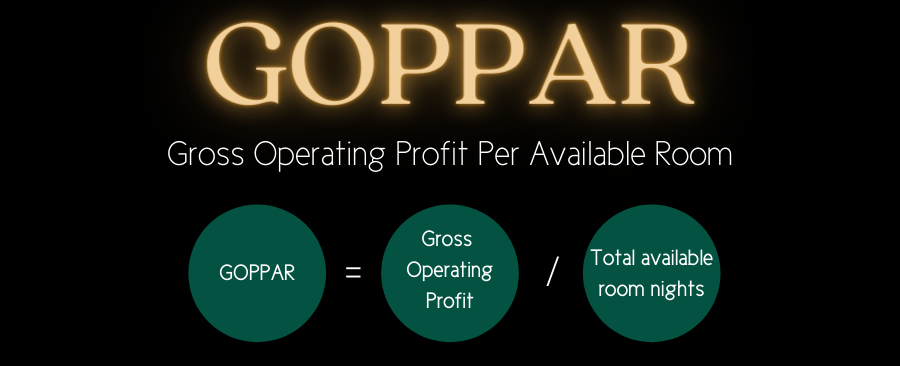COVID-19 Accelerates The Need For The Hotel Industry to Adopt GOPPAR
By: Dustin Caromano
An Introduction to GOPPAR
As hotel veterans, we are no strangers to the extensive list of acronyms that plague our industry. And for many of us, it can seem like new ones are being invented daily, further reducing our professional jargon to lingo completely foreign to an outsider. And while I'm not here to change the trajectory of how we articulate key concepts, I am here to advocate for the integration and adoption of GOPPAR into everyday conversations due to its value in our current environment. I know, I'm that guy who just agreed that we have too many acronyms to juggle only to add another to our collective plates... but hear me out on this one. GOPPAR, also known as Gross Operating Profit Per Available Room, has been a topic of conversation that has slowly gained traction over the last few years as hoteliers look to fine-tune KPIs on how they measure and articulate the performance of an asset.

Prior to the pandemic, STR reported that the hotel industry enjoyed over 100 straight months of top-line revenue growth, reducing the urgency to redefine baseline benchmarks as we were all busy basking in the consistent and reliable stream of revenue being shined upon us. After all, why re-invent the wheel when it looks to be working just fine? But is it really working just fine if we are only measuring success around room revenue? Understanding a hotel's performance beyond the room product would have aided in addressing some difficult decisions early on during the pandemic, and even more so, on how to proceed through reopening. It's funny to think that not too long-ago occupancy was once the gold standard for benchmarking and how we evaluated our position in the market. Fortunately, we've come a long way since those days, but the quest for a more accurate and holistic diagnosis is something we all crave, and quite frankly, need.
Why is now the time to adopt GOPPAR?
The impact on our industry as the globe stopped traveling due to COVID-19, and the hurdles we continue to face as we reopen our doors, have illustrated that it's more important than ever for hotels to focus beyond the revenue generated per room, and look at their asset more holistically. By accounting for all top-line revenue generated for an asset across its various revenue streams and evaluating bottom-line expenses such as labor and technology costs, hotels are truly able to understand profitability and think beyond selling rooms.
While attending the Hotel Data Conference in Nashville Tennessee, the need to adopt GOPPAR became even more evident as industry leaders discussed the path forward, while reflecting on recent decisions. For many properties, it was the norm for hotels to eliminate services and amenities from their operation to reduce bottom-line expenses. On the surface, it makes complete sense. However, upon reflection, there were multiple revenue-generating opportunities lost during the pandemic due to a lack of understanding of the mechanics of each revenue stream. And now with the current labor crisis, an additional struggle to staff up to service guests accordingly.
Let's use room service as an example. This was a missed opportunity for many hotels where guests had limited food options due to local government restrictions. By offering room service, hotels would have been able to drive ancillary revenues to offset losses from room revenue, provide a better and more safe experience for guests by reducing outside contact, and kept staff onboard for when travel demand returned. If hotels were utilizing GOPPAR, they would have been able to easily analyze how to make room service function and still be profitable during the pandemic instead of taking the simple approach of reducing costs via cutting labor and services as a blanket approach to improving profitability.
Can we afford to wait?
There has been no other industry more widely impacted by the effects of COVID-19 than travel, and those challenges are far from over as we struggle to hire talent, accurately forecast demand, exceed the needs of our guests, and adapt to ever-evolving travel restrictions as new variants emerge. Hotels are doing far more with far less support and historical experience to rely on due to a reduction in staff or a complete loss of subject matter expertise on-site. How can hotels possibly dive even deeper into hotel financials and re-think how they measure their performance when they are struggling to service guests and get their operations back up and running.
The short answer is NO, we can’t afford to wait. With occupancy levels still double digits behind the height of 2019, and Corporate/Business travel not expected to return to 2022, relying on RevPAR alone will ensure you’re leaving money on the table. Now is the time to figure out how to drive increased operational profits on small, flat, or even declining revenue streams. While this will require multiple team members to analyze the business to provide detailed financials, the outcome and knowledge gained will be instrumental in navigating the future.
As revenue leaders continue to evolve into commercial roles responsible for all streams, understanding the details at this level allows them to manage performance more effectively beyond top-line room revenue. This doesn't just boast well for revenue generators who can create and execute strategies to drive ancillary revenues outside of the room product, but also operators who can optimize costs to reduce bottom-line expenses. GOPPAR takes the sole focus off revenue generation and looks to understand how all moving pieces from labor, rent, cost of goods, technology, etc., can impact a hotel's ability to make money. GOPPAR says "So what if your RevPAR is growing if you're cutting into or not maximizing profits in other ways", and I could not agree more.


